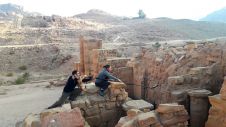Technology is Often Accused of Being a Disrupter
This article was originally published in Geomatics World.
In Sweden, the land title organisation, Lantmäteriet is piloting the use of the innovative financial technology Blockchain, best known as the enabling technology behind the virtual currency bitcoin where each transaction is recorded with Blockchain in an ever-growing string of code. Once a transaction has been entered into the digital ledger it cannot be edited. For Lantmäteriet, there is potential in removing some steps and traditional manual processes in a transaction resulting in automation.
Blockchain creates trust through how it handles digital originals, verifies the legal processes and provides transparency. It is estimated this could result in savings of some £70 per annum in Sweden with less paperwork and faster transactions. The challenges, as many data-centric businesses will appreciate, are that digitizing legacy paper records comes with its own complications. The Swedish system could be operational as early as 2019. In the UK, the Law Commission is reviewing the Land Registration Act 2002 and will report in late 2017.
So technology isn’t always restricted in use, slow in adoption, or a cause of disruption. In this edition you can follow the use of cloud computing technology. Remember that GPS opened up opportunities for non-traditional professionals. The introduction and increasing use of drones, has prompted reaction from authorities worried about their increasing commercial use. Recent mandated registration in the US (those weighing between 0.55lb and 55lbs) resulted in over 600,000 people signing up. Regulating their use may be necessary but we can adopt and benefit from drones in generating new datasets, new products and new clients. The outcome of the UK government’s recently closed consultation on their use will be critical; we will provide an update when available.
Being in a Good Place
In the meantime, a good place to assess how our profession is adapting and using new technology is at conferences and exhibitions. There are two important ones this May. Firstly GeoBusiness (23-24 May 2017) at the Business Design Centre, in London, UK. Lots of geospatial businesses, organisations and educational establishments will be there. If you’re in London, the UK or even Europe this is definitely one to get to.
The following week FIG Working Week takes place in Helsinki. The Working Week brings together the surveying community and various UN bodies to provide relevance to the Sustainable Development Goals. This is the key event for national bodies and institutions, such as RICS, and the wider surveying community to develop work on land governance, surveying standards for geodetics as well as buildings and how technology might impact or support us. It is also a key event for young surveyors who will become our future leaders.
For some of us the day job can be quite far removed from such events and even the technical topics considered may be quite abstract for the majority of surveyors. However, FIG represents an important level of influence and representation for all surveyors, with guidelines and standards for ethics and self-regulation, whilst also providing technical guidance and assistance to the wider community.
Ocean Focus Ahead
For FIG, a new opportunity presents itself at the UN this June. An influential UN Oceans Conference is to take place to develop policy and thinking towards achieving the Sustainable Goals relating to the oceans and our seas.
The theme of encouraging students and the younger generation to get involved and to understand what surveyors, cartographers, hydrographic surveyors and spatial data, managers and GIS professional do, continues and especially through initiatives such as a “Class of Your Own” and “Restless Earth” (run by the British Cartographic Society). In addition, as I’ve written previously, there are new trailblazer apprenticeships on their way.
So it’s a busy and eventful summer ahead in the northern hemisphere. A year after the UK’s vote to leave the EU many of the implications are unclear but we will continue to work towards ensuring a fair and equitable outcome for the Surveying and Geomatics profession.
This article was published in Geomatics World May/June 2017

Value staying current with geomatics?
Stay on the map with our expertly curated newsletters.
We provide educational insights, industry updates, and inspiring stories to help you learn, grow, and reach your full potential in your field. Don't miss out - subscribe today and ensure you're always informed, educated, and inspired.
Choose your newsletter(s)
























